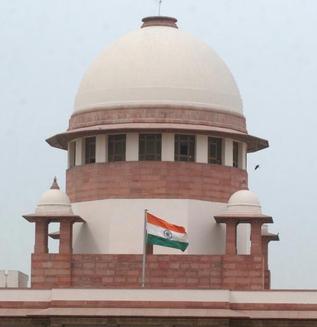THE HINDU
Rejecting the criticism of judicial activism, the Supreme Court has said the judiciary has stepped in to give directions only because of executive inaction what with laws enacted by Parliament and the State legislatures in the last 63 years for the poor not being implemented properly. A Bench of Justices G.S. Singhvi and A.K. Ganguly pointed out that laws enacted for achieving the goals set out in the Preamble to the Constitution had been extremely inadequate and tardy, and the benefit of welfare measures enshrined in those legislation had not reached millions of poor, downtrodden and disadvantaged sections, nor did efforts to bridge the gap between the haves and have-nots yield the desired result.
Writing the judgment in a case related to sewerage workers, Justice Singhvi said: “The most unfortunate part of the scenario is that whenever one of the three constituents of the state i.e. the judiciary issues directions for ensuring that the right to equality, life and liberty no longer remains illusory for those who suffer from the handicaps of poverty, illiteracy and ignorance, and directions are given for implementation of the laws enacted by the legislature for the benefit of the have-nots, a theoretical debate is started by raising the bogey of judicial activism or overreach.”
The Bench pointed out that the orders issued for the benefit of weaker sections were invariably challenged in the higher courts. In a large number of cases, the sole object of this exercise is to tire out those who genuinely espouse the cause of the weak and the poor. Justifying the directions issued by the Delhi High Court for protection of sewerage workers on a public interest litigation petition, the Bench said: “The superior courts will be failing in their constitutional duty if they decline to entertain petitions filed by genuine social groups, NGOs and social workers for espousing the cause of those who are deprived of the basic rights available to every human being, what to say of fundamental rights guaranteed under the Constitution.”
The Bench clarified that it deemed it necessary to erase the impression and misgivings among some people that the superior courts, by entertaining PIL petitions for espousing the cause of the poor who could not seek protection and vindication of their rights, exceeded the unwritten boundaries of their jurisdiction. The judges said it was the duty of the judiciary, like that of the political and executive constituents of the state, to protect the rights of every citizen and ensure that everyone lived with dignity.
Beijing statement
Quoting the judiciary’s objectives as mentioned in the 1995 Beijing statement, the Bench said these would include ensuring that all persons were able to live securely under the rule of law; promoting within the proper limits of the judicial function the observance and attainment of human rights, and administering the law impartially among persons and between persons and the state.
http://www.thehindu.com/todays-paper/tp-national/article2228591.ece
Related articles
- Keep PM, higher judiciary out of Lokpal: ex-CJI (indialawyers.wordpress.com)
- Weighing The Scales (indialawyers.wordpress.com)
- Centre planning to revisit collegium system of judicial appointments (indialawyers.wordpress.com)
- CJI deferred setting up of constitution bench (indialawyers.wordpress.com)
- Bail and Discretion (indialawyers.wordpress.com)
- State biggest land grabber, says Supreme Court (indialawyers.wordpress.com)
- Looking for knights in black robes (indialawyers.wordpress.com)
- Green Tribunal: SC lifts stay, body to function from May (indialawyers.wordpress.com)
- Campaign Mode Approach to Reduce Pendency in Courts (indialawyers.wordpress.com)
